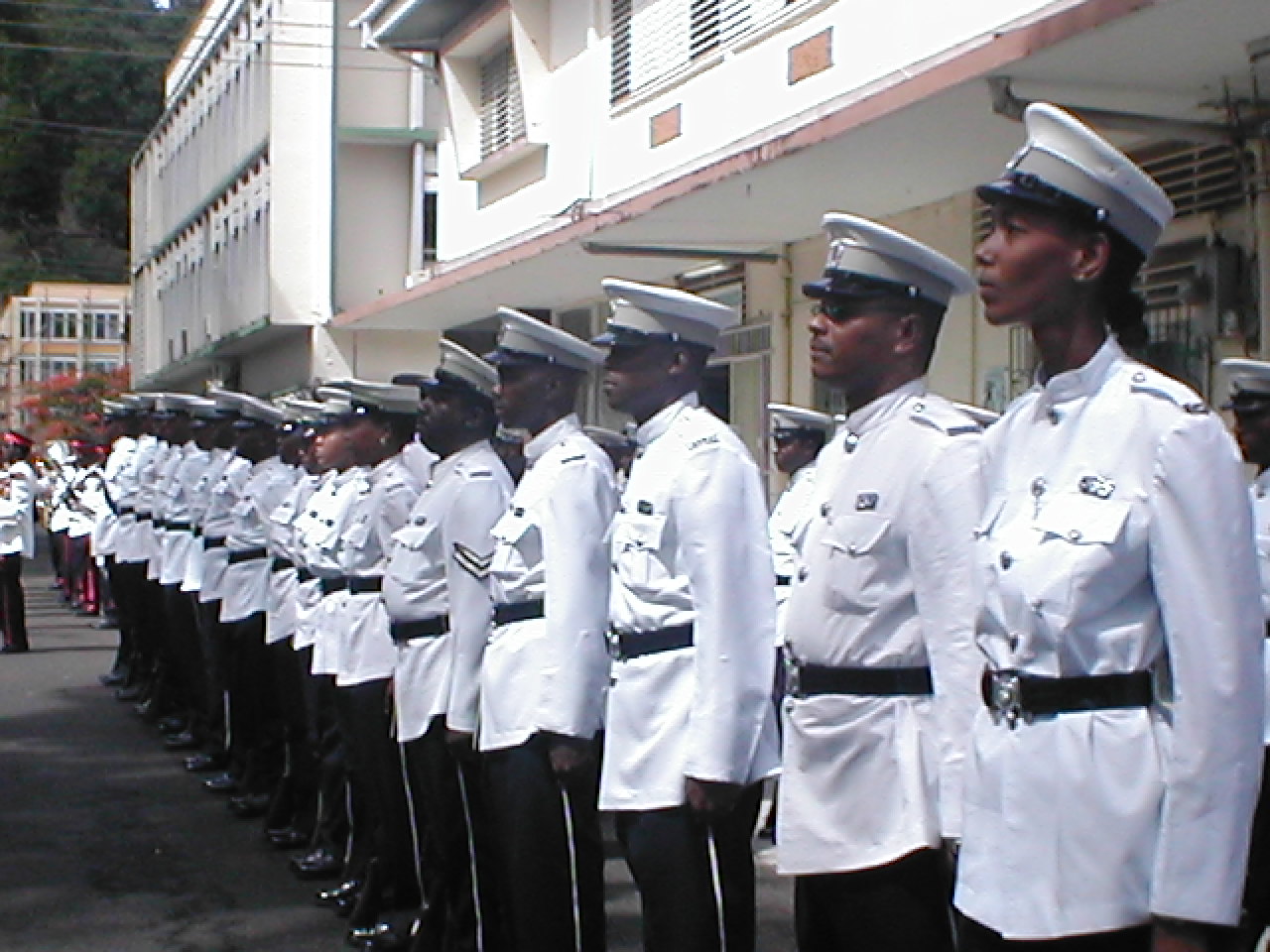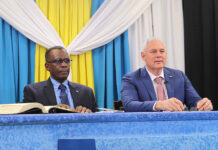Over the past several weeks, social media has been replete with alleged actions by politicians, and the hierarchy of the Royal Saint Lucia Police Force, against officers, who have allegedly engaged in political and partisan activities. Yes, there is a difference!
The first is permissible, the latter problematic! The first in this context is such that one engages in an objective critique on issues facing government, governance, power structures and policies. The latter is, confining one’s critique exclusively to a political party. Our local vernacular calls it party hacks.
But whether these allegations against the police officers are factual is immaterial to the argument I will proffer, i.e. it is incessantly infuriating that when these situations are debated in our public discourse very little attention is paid the longer-term developmental and democratic implications. More particularly, the interrogation of the law which prohibits an action is not done, which in this case is the prohibition of police officers to engage in politics in order to maintain the neutrality and impartiality of the police force as they serve the public.
Instead, much fanfare is placed around the political actors at the time, in an effort to score partisan points, and brand politicians as demagogues, despots and autocrats. On the other end, defenders of the status quo are quick in their defence that the law is the law, as if to suggest that the law is not man-made and cannot be changed, or that sometimes it is not the law itself which is the basis of the reduction of freedoms.
There is thus a vacuum in the middle of this discourse! All of the instances featured the media seem to stem from ‘The Law As Is,’ which is that in Saint Lucia, among many other Commonwealth Caribbean Countries, civil servants which in this case includes police officers, as per the 1.7 of the Public Service Staff Orders, are unable to engage in political activity unless they resign their positions as per Chapter IV of the same orders.
The Staff Orders provide for many activities which public servants are prohibited from. They include but are not limited to: 1) Publication of Books or Articles, which may be reasonably be regarded as of a political or administrative nature, and if it is connected to one’s work, then they must obtain the prior consent of the Secretary to the Cabinet. 2) Calling of public meetings to consider any action by the Government or speak or take part in such a meeting. Further, it means one cannot speak at that meeting on the platform which is convened for the object of discussing a matter which involves the Government or the actions of the Government. It seems it is only religious meetings are permitted. 3) Officers are unable to take active part in any political organisation. 4) Engage in any public or political controversy where they publicly critique the policies of Government or individual Ministries. 5) Write letters to the press, public books or articles, circulate leaflets or pamphlets or participate in radio or television broadcast on political matters. 6) Canvass in support of political parties in any way publicly and supporting or indicating support for any political party or candidate.
These are framed as broad prohibitions, but one can assume that the enforcement of the prohibition is only for those who ‘oppose’ government and observed in the breach when they resume office. The higher one is on the greasy political pole, the more leeway one has to breach these sections with impunity. It is those who oppose “de party”who are punished. But the first problem with the staff orders is that the term “political activity” is not defined, which means that it inherently provides the enforcer with a wide discretion, which they must use reasonably however to interpret the words.
Knowing what we know of the definition though, any and everything involving the critique of government and governance is debarred, thereby creating significant implications for the freedom of expression of citizens. When one reads this however, with the definition of ‘politics’ in mind, someone who writes a book critiquing the CIP would contravene the sections and can be liable for punishment. Someone who actively takes part in a political organisation, such as any of the political parties while being a public servant is also contravening the sections. A public servant who calls a radio show to complain about the state of health care even if speaking from experience can contravene this section.
And the lack of enforcement does not mean it is not a contravention. The wide nature of the definition of ‘politics therefore should be constrained, as it seems that any action can be classified and be a contravention. If what is being said about the police officers are true therefore, it would appear that they have contravened the public service staff orders.
The question therefore should not be what their punishment should be, or questioning whether they indeed contravened the sections, but whether in a modern democracy, notwithstanding CLR James antipathy, that these sections are relevant and should not be repealed, especially when the colonials who gave us the sections, have long moved away from its strict anti-democratic notions.
As you know, though, the reasoning for the orders was that public servants are supposed to be impartial in the execution of their duties and because of their permanency as they work through different administrations of varying ideological persuasions. Politicians go, but public servants stay! That is why the Public Service Commission and other commissions exist. They are insulated from the politicians and in turn are insulated from the politics. As such, there is a fear that if public servants are permitted to engage in political and partisan discourse, support candidates, openly support parties, then they would be unable to execute their duties in an impartial, unbiased and fair way. It was guarding public servants from serving two masters! It was aimed at preventing the public servants from on one day critiquing the government and having to come to work tomorrow to further that same agenda of the Government. It seemed counterproductive.
Somewhere there it probably hoped that public servants would channel their dissent inwards, but did it countenance unresponsive partisan leadership? But now we must ask whether our people are so inherently partisan or political that they would be unable to execute their duties without their partisan or political lens on? Are our people so ‘immature’ that they need to be guarded against themselves, even in this way?
Across the Caribbean from 1981 to a few years ago, cases such as De Freitas v. The Permanent Secretary of Ministry of Agriculture, Fisheries, Lands and Housing and Others, Natalie Murray v. The Attorney General of Barbados, Leon Natta-Nelson v. Attorney General of St. Kitts and Nevis, Claude Gerald and the Governor of Monseratt, the Public Service Commission and the Attorney General, among others, have ruled quite authoritatively that the public service orders which preclude public servants’ participation in politics is unconstitutional.
The common theme is that the relevant provisions of orders contravene the freedom of conscience, expression, assembly, association and the protection of the law in the Constitutions. By way of illustration, the orders prohibit the sharing of opinions and information on politics in the country and as such it immediately implicates and breaches the freedom of expression, which permits the right for individuals to express ideas and criticize the operations of institutions. Notwithstanding, the public service orders lack of a prohibition on public servants from being a member of a political party, it may still contravene freedom of association and assembly, because it constrains the association of one within the political party.
As per the service orders, one cannot “actively engage” in the political party. It has never been judicially tested in Saint Lucia, which it should, but one can assume that active engagement in our political parties can include, holding of executive positions, running for office while being a public servant serving on committees of the party, etc. As such, the inability to actively participate in the political party may contravene the freedom of association, because human rights are supposed to be interpreted in a liberal way as the aim is to provide one with the full expression of their rights, not limit it.
Lastly, it may contravene the protection of the law, which in recent times according to the CCJ in Maya Indigenous Communities of the Toledo District v. Belize Report No 40/04, among other cases, prohibits actions by Governments which arbitrarily or unfairly deprive individuals of their basic rights. As such, because the prohibition on public servants make no distinction based on the type of employee, it can contravene the right because it is arbitrary. Of course, as is well known, the human rights in our Constitutions are not absolute and can be limited if it can be proved that it is necessary to protect the rights of others in the public interest, public safety, public health etc.
In this instance, though, the courts have consistently held that, the inability of the state to show that the limitation was the least intrusive measure required to achieve the impartiality of the civil service, means that it does not conform to constitutional test for limiting the rights. The courts have held that because the staff orders preclude all civil servants regardless of their rank or function, it would be arbitrary, unreasonable and thus unconstitutional. As a matter of fact, any blanket prohibition against all public servants would quite simply deny fundamental rights and freedoms for too many people and is thus unconstitutional.
As such, one can assume the same would obtain in our country. But what should the law be? As a country, we need to adopt the approach of the UK, or develop our own approach, who by the way have moved beyond the strict impartiality of the public service that they foisted on Caribbean countries and adopt a tiered approach towards prohibiting public servants from participating in politics. There is a need for us to further develop more robust definitions of political activity, the types of public servants who would be able to engage and not engage in political activity, and the procedure and process for requesting permission for engagement in political activity.
As such, the closer one is to the policy making process, the more one is exposed to sensitive information, the greater the need for impartiality of the public servant such as Permanent Secretaries, the greater the need for one to be prohibited from active political activity. Thus, policy makers need to look at the roles, responsibilities, powers and the rank of the Police Force and created a tiered approach towards their participation in politics, as it is wholly undemocratic to prohibit all by virtue of the public service orders.
It is particularly problematic when a country has limited critical mass, by virtue of their population to deny such a wide cross section of the public service from engaging in that which is so innate and necessary in our society i.e., being political. As a matter of fact, it is only politics which can cause us to develop as a country. Our conversation on this issue needs to go beyond cheap partisan points, by fringe superPACs of the parties, as the rules are only policed against opposition forces and vici versa. Meanwhile, it would be important to remember that eternal vigilance of the continued encroaching and usurping of our fundamental rights is the price of liberty.
More freedom, not less!










